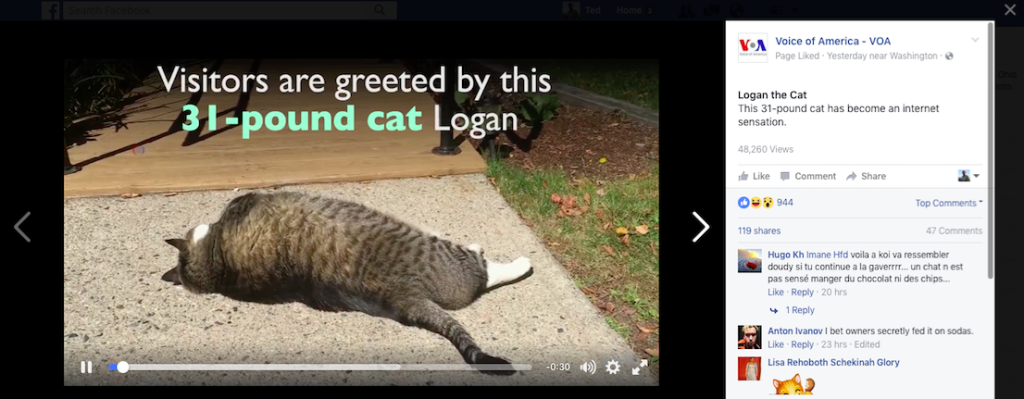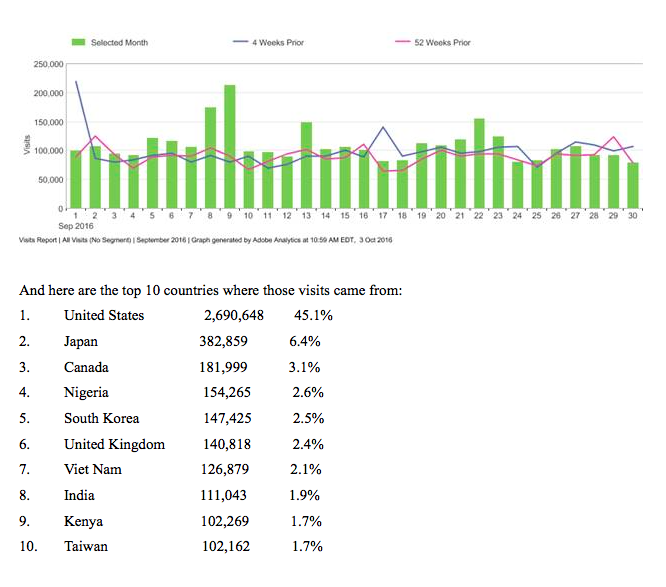BBG Watch Commentary EXCLUSIVE
One of U.S. taxpayer-funded Voice of America (VOA) newsroom editors disclosed in an internal email that 45.1% of visits to the VOA English news website in September 2016 came from the United States, even though by law VOA should not target or seek a U.S. domestic audience — something that neither Congress nor most U.S. taxpayers would tolerate considering that VOA is a news operation controlled by the U.S. federal government. VOA must instead, in accordance with its Charter (Public Law 94-350) and its agency’s (Broadcasting Board of Governors) mission, be focused on supporting freedom and democracy in countries that lack free media. However, the number of visits to VOA websites, whether in English or in foreign languages, in countries like China, Iran or Russia is minuscule.
The number of monthly visitors to the VOA English website in September — 3.2 million visits in September 2016, as reported in the VOA internal email dated October 3 — is truly tiny in the digital age for a U.S. government-run news organization which costs U.S. taxpayers over $224 million annually (BBG’s entire FY2017 budget is $777.8 million).
Washington Post and New York Times
Compared to VOA English website’s 3.2 million monthly visitors, in December 2015, just one U.S. newspaper, The Washington Post, reported 76 million visitors, and 64 million visitors in April 2016. The New York Times had close to 73 million unique visitors to in April 2016. It is not clear from the VOA email whether VOA’s September 2016 number of 3.2 million was for unique visits.
BBC
Internationally, BBC.com, the BBC’s international website, has many times more monthly users than VOA’s English website. In January 2015, BBC reported in a press release that “more than 101 million unique browsers used the website and news app globally during the month of January, generating a record 1.35 billion page views.”
Russia’s RT
 VOA English website also has nowhere near the number of visitors of Russia’s propaganda outlet RT. RT reported in a February 2016 press release that “RT’s total monthly online audience jumped to 49 million unique users, according to a comScore study of RT’s consumption via PCs, mobile devices and YouTube worldwide.”
VOA English website also has nowhere near the number of visitors of Russia’s propaganda outlet RT. RT reported in a February 2016 press release that “RT’s total monthly online audience jumped to 49 million unique users, according to a comScore study of RT’s consumption via PCs, mobile devices and YouTube worldwide.”
English Speakers
There are about 360 million native English speakers in the world and probably about billion people with sufficient knowledge of English to read news, although not all of them may have access to the Internet. Even with 45% of visitors from the U.S. — who cannot be officially counted as VOA’s audience — the Voice of America English website with 3.2 million monthly visitors has almost no impact. This is especially true for high priority countries like China, Russia, or Iran.
No Priority Media Freedom-Denied Countries for VOA English Website
Of the ten countries from which most visitors to VOA English website were recorded, only one — Vietnam — can be considered as lacking free media.
The United States was the country with the largest number of visitors to the VOA English website (45.1%), followed by Japan (6.4%), Canada (3.1%), and Nigeria (2.6%).
China, Iran, Russia, Cuba, North Korea — some of the priority countries for VOA’s parent agency, the Broadcasting Board of Governors (BBG), are not among top ten countries from which visitors accessed VOA’s English website.
VOA Journalists Put Blame On Poor Leadership
Many VOA journalists blame the BBG and its CEO John Lansing for not providing leadership and carrying out management reforms. They gave BBG and VOA management record low ratings in the 2016 Office of Personnel Management’s (OPM) Federal Employee Viewpoint Survey (FEVS) which measures satisfaction with leadership and employee engagement. “The Broadcasting Board of Governors, another regular bottom-feeder that oversees the Voice of America and other government broadcasters … is going backward” in leadership and employee engagement categories, Washington Post columnist Joe Davidson reported on the 2016 FEVS results for the agency.
Most Viewed Reports Are Not VOA’s
To make things worse, five of the most viewed news reports on the VOA English website were not original VOA reports but reposted news agency (Reuters and AP) stories. This raises the question to what extent these non-VOA news reports are in accordance with the strict requirements of the VOA Charter for accuracy, balance, comprehensiveness, inclusion of multiple points of view and presentation and explanation of U.S. policies. An news agency report recently posted on the VOA website presented only the Chinese Communist Party version of China’s history under Mao.
The most viewed report on the VOA website in September 2016 was from Reuters: “Girls’ dreams shattered as Nepal fails to curb child marriage.”
U.S. Visitors and Potential Impact of VOA’s Bias on U.S. Elections
The large number of visitors to the VOA English website from the United States raises another question to what extent U.S. election campaign reporting by U.S. government-employed Voice of America journalists and contractors can affect the outcome of the U.S. presidential vote in November. Supporters of both Bernie Sanders and Donald Trump had accused the Voice of America of “state-media bias” — U.S. taxpayer-funded VOA posting biased and one-sided attacks on their favored candidates. VOA Director Amanda Bennett had ordered anti-biased training for VOA reporters, but critics say that some of her other statements and decisions, such as holding discussion panels limited to only one ethnic or religious group, have encouraged biased reporting by VOA.
As Secretary of State and ex officio BBG member, Hillary Clinton had concluded already in 2013 that the Broadcasting Board of Governors is “practically defunct.” But current BBG Chairman Jeff Shell and BBG CEO John Lansing are opposing bipartisan efforts in Congress to reform the agency through pending H.R. 2323 bipartisan legislation.
Charges of Poor Quality and Waste
In order to increase web and social media traffic, VOA has been posting an increasing number of poorly produced “click bait” animal videos, some of them with misspellings in their captions.

The number of such videos has increased since John Lansing became BBG’s CEO in September 2015. Critics point out that he lacks substantive prior experience in U.S. government operations, international affairs, international communications, U.S. foreign policy and public diplomacy, but in his prior private sector career he was a successful manager of TV entertainment channels such as Food Network, HGTV, Travel Channel, DIY, Cooking Channel and Great American Country.
Whether John Lansing and Amanda Bennett lack critical experience and leadership skills or simply do not know how to engage with BBG employees, BBG Watch has been receiving a growing number of emails from VOA journalists and other BBG employees who express deep frustration and disillusionment with new leaders, management, quality of programs and what they see as the lack of meaningful reforms. They have been alerting BBG Watch to what they consider to be many examples of wasting taxpayers’ money by the agency’s management.
One of the most popular recent VOA videos was “Turtle Nesting in Mexico.” Another popular VOA video showed a fat cat and a 50 year-old giant tortoise eating watermelon on his birthday in Australia, all produced at U.S. taxpayers’ expense.
VOA’s social media numbers cannot be in any case considered indicative of actual interest in VOA reports since the organization is believed to be also spending U.S. taxpayers’ dollars on boosting its social media posts with ads.
We have received these comments:
“…cronyism, corruption and waste is the name of the game…”
“They do not genuinely understand the broadcast operation and its platforms: TV, Radio, Internet – web and social media.”
“The article written by the VOA journalist … applies perfectly to RFE/RL as well. With one observation: while VOA employees at least enjoy the status of federal employees, those at RFE/RL are left at the mercy of an all-powerful management.”
“Pathetic. And can’t spell ‘doesn’t’?”
“Remembering that the world population is over 7-BILLION.”
“Atrocious.”
“The many ways you can spell ‘dead’ for this agency.”
“‘Turtle nesting in Mexico’ tops their Facebook stuff?!?!? That really satisfies its news requirement under the Charter.”
“They can’t even get any traction about ‘losing the information war’ with Russia.”
“Dead as dead can be.”
###
Voice of America Video
After BBG Watch posted its commentary, VOA appears to have removed the Logan the Cat video.
Voice of America Video
But BBG Watch took a screenshot when the video was still on VOA’s Facebook page.

###

BBG CEO John Lansing’s Perspective
From: IBB Notices Admin
Sent: Wednesday, September 14, 2016 2:12:22 PM
To: IBB Notices Administration
Subject: Year in Review & Looking Forward
Dear Colleagues,
Today marks my one year of service at the Broadcasting Board of Governors, and I continue to be impressed by the dedicated group of people who work here in the Cohen Building, across our five BBG brands, and around the world.
Over the past year I have watched this exceptional team achieve strong audience growth, give life to exciting new content opportunities, particularly in digital and mobile media, push for industry-leading ways to achieve impact in our programming, as we collectively work to inform, engage and connect with people in support of freedom and democracy.
Together, we have achieved a lot.
The ICC – Strategic Coordination
One of the most impactful things we did last year was form the U.S. international media Coordinating Committee (ICC) to facilitate strategic coordination across the BBG’s five networks and the IBB. There have been substantive improvements in favor of our key audiences based on this coordinated and strategic approach from Russia to China, Iran, Cuba, North Korea and covering CVE. The ICC now meets twice a month with me to discuss further collaboration and jointly worked with the IBB to develop and submit our FY 2017 and FY 2018 budgets.
Measuring BBG’s Impact on Key Audiences
Equally important, together we are growing our focus on achieving impact through our journalism. BBG reaches an audience of 226 million weekly, which only goes to show the hunger for our accurate and reliable content around the world. But it is also clear that reach is not enough – we need our journalism and programming to impact the lives of our audiences and their communities as well. That is why I was so pleased when, in February of this year, we hosted an Impact Summit where research directors of each BBG network came together and agreed upon an enhanced Impact Model to evaluate all BBG content.
Aggressive Push into Digital / Mobile / Social
We also made several advancements to increase access and engagement on social/mobile platforms to reach younger, more urban audiences, future leaders and influencers. There already was a lot of work being done in this area before I arrived, but I am proud to say that we are pushing the envelope significantly further. In just a few weeks, we will convene a Social Media Summit to look at best practices across BBG, establish baseline expectations, and promote future growth in mobile / social media across our networks.
Putting Our Audiences First – On Their Terms
And we continue to create and scale up innovative and compelling new content and reporting that is making a difference around the world. For instance:
— MBN’s multi-platform Raise Your Voice initiative is connecting audiences in the Middle East as they fight back against ISIS recruitment
— OCB’s aggressive push to open up Cuba to Internet freedom
— RFA’s powerful investigative stories halting the construction of faulty health clinics by North Korea in Africa
— RFE/RL’s collaborative success story with an expanded Current Time on all platforms and aggressive DIGIM strategy
— VOA’s collaboration on Current Time, and its successful launch of the Global Town Hall in Somalia
And there is so much more being done across our networks, and at the IBB, that I simply do not have space to list them all here.
None of these advancements would be possible without your tireless support, commitment, and mission-driven energy – whether you are contributing to the team at IBB or serving in any of the many responsibilities at our networks. It is YOUR work that earns our audiences’ respect as a trusted source of news and safe access to a free Internet.
Yet, while this has been a remarkable year and we made many strides, there is still more we need to do to continue to transform our global operations to succeed in today’s rapidly evolving media environment. I look forward to working alongside you for the next year to do just that.
But, for the moment, I only wish to say this: I am proud to come to work every day and work alongside all of you to achieve our important mission. The BBG team is an extraordinary one, and I thank you for welcoming me.
With sincere gratitude,
John F. Lansing
CEO and Director
Broadcasting Board of Governors
BBG CEO John Lansing’s Perspective (Cont.)
Dear Colleagues,
The initial report on the Federal Employee Viewpoint Survey (FEVS) results for the agency was released this week by the Office of Personnel Management (OPM). Additional reports to follow in the next couple of months will add further analysis and government wide comparisons. I want to thank everyone who took the time to respond to the survey this year.
Our response rate of 63.3% was down some from 2015, but still well above the government-wide 45.8% response rate. We appreciate your honest feedback and will use the results to help us implement key actions and to plan new ways to better meet your needs. We are committed to making BBG a better place to work and will continue do everything we can to make this a reality.
Let me update you on what we are doing, and ways you can become involved.
First and foremost, I launched the agency-wide Workplace Solutions effort to review the survey results and develop solutions that address FEVS-identified issues. This initiative is proceeding well. Action teams are working on 23 recommendations and five of these are already partially or fully implemented, including launching a new mentoring program, creating the Workplace Solutions feedback mailbox, and issuing the CEO commitment letter. You can keep up with the activities of Workplace Solutions by visiting https://bbg.sharepoint.com/our-agency/workplace-solutions.
If you have any questions regarding the Workplace Solutions effort, please contact … of the Office of Management Services. You can also ask questions or make suggestions about workplace issues by writing to WorkPlaceSolutions@bbg.gov.
Additionally, the website UnlockTalent.gov is available to all employees and provides more information on the survey results, especially as they apply to Employee Engagement and Global Satisfaction Indices. OPM will begin updating this site with 2016 data in the next few months. When you first access the site, you will be able to see high level FEVS results across government. By becoming a registered user, you will be able to view the BBG’s results for Employee Engagement as well as Global Satisfaction. You will also have access to the Community of Practice page, which includes tools needed to create strategies that lead to an inclusive work environment. Please note that to become a registered user, you will need to use your @bbg.gov e-mail address. For those of you with @voanews.com email address, please use your username and @VOA.gov in order to access the site. If you have any questions regarding your access to the dashboard, please contact unlocktalent@opm.gov.
We will continue to make employee satisfaction and response to your feedback a priority. Please do not hesitate to use any of the above resources, or reach out to my team directly, if you have ideas, criticisms, or further insights.
In the meanwhile, I invite you to view the 2016 FEVS results as they become available by visiting https://bbg.sharepoint.com/sites/fevs/Pages/Default.aspx.
Sincerely,
John F. Lansing
Chief Executive Officer and Director
Broadcasting Board of Governors

4 comments
That fat cat “doens’t” eat much. These fat cats in the management do eat much. Much money.
It’s almost like mgmt is daring Congress to shut voa down for good.
The assertion in this article that the VOA English news web site has so many US readers is due to the site targeting a US audience is way off. I worked as a senior editor on that site for 13 years since it was started and I reviewed the monthly web usage statistics during that entire time. The number cited in this report about US visitors has always been about that high since the site began.
The reason there is such a high percentage of US viewers to the VOA English web site is because there are more English speakers in the US. Once you put an article on the Internet in English, you have no control over who sees it The Internet is not like radio. You can’t beam an Internet signal to certain countries or away from certain countries. Counties like China and Iran can ban certain foreign sites like VOA because the government controls their nations’ Internet Service Providers. There is no such control in the US.
The portions of the monthly report you cited do not include a listing of how viewers got to the site, whether directly by typing in voanews.com or through a search engline like Google News. This is a crucial piece of information when assessing a site’s web traffic. When I was working on the web desk, a large portion of the traffic came from people using search words in Google News for stories they were interested in seeing.
Ironically, the one thing BBG Watch complains most about when it comes to the VOA English web site, I.e. its poor performance in posting breaking news, is related to the high US viewership. When the VOA English web site is competitive with other news organizations in posting breaking news in a timely manner, it gets a lot more views through the search engines because the VOA stories are placed right along side other news oegazations versions of the same stories. And that tends to also boost US viewership.
You are also off the mark when you note the statistics about the lack of penetration of VOA English in target closed societies. To determine the success of that penetration, you’d need to determine how other English news web sites are penetrating those countries and compare VOA with them.
I’m not defending the English web site on several of the other topics you mention, but I think it is worth pointing out that to suggest there is something VOA or any website can do to easily target English news to particular countries or to not target them, shows a lack of understanding of how the Internet and web news works.
The Broadcasting Board of Governors and BBG executives have been eying U.S. domestic audience for years. Their lobbying in Congress led to the lifting of some of the restrictions of the 1948 Smith-Mundt Act which in turn revived not so far-fetched accusations of U.S. government domestic media propaganda. They have, however, failed to achieve any kind of meaningful audience and audience engagement, either in the U.S. or abroad. They are buying Facebook “Likes” and even that produces measly results.
Comments are closed.